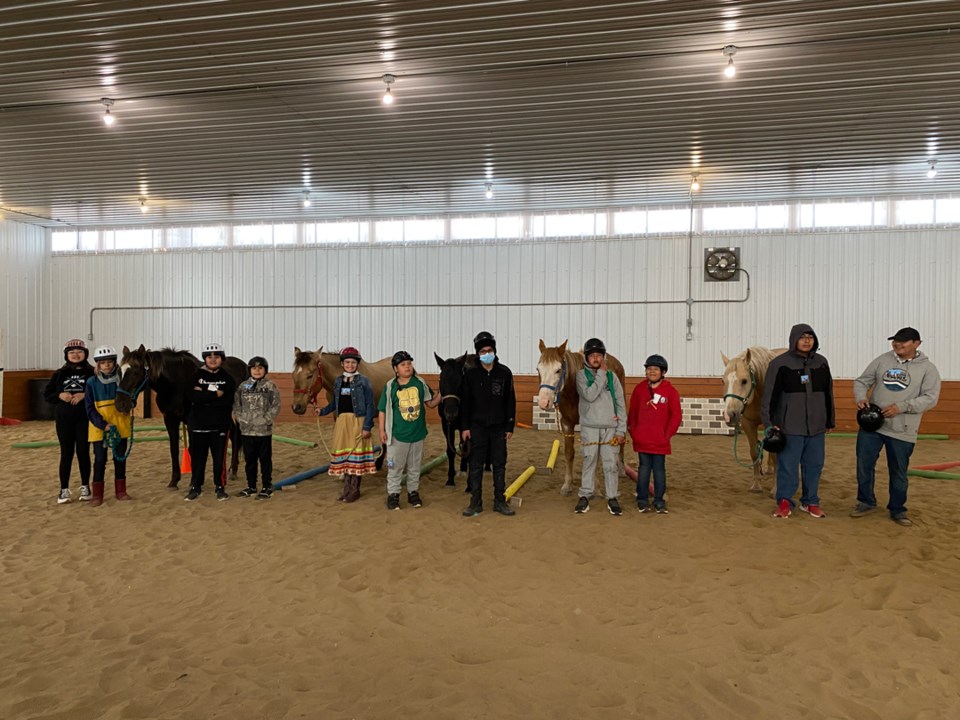STOUGHTON - There were excitement, smiles and nickering at the Rising Hope Ranch on June 1.
After a 12-week equine assisted learning (EAL) program at the ranch, 12 eager students from Ocean Man First Nation would graduate.
The reserve brought grateful parents, grandparents and friends to attend the special event held at the ranch.
Teresa Dyck is the owner and operator of Rising Hope Ranch, located east of Kisbey on Highway 13.
Originally this place was a PMU farm that began in 2002, but in 2018 their contract was finished, and it was now that Dyck could do what she loved to do.
Since then, Dyck has moved on to bigger things – teaching young and old all about the importance a horse can make in one’s life, and this is when Rising Hope Ranch was born.
Dyck has always enjoyed working with the young and loves to see the change that happens when they are around horses. Dyck’s EAL program teaches, through the use of a horse, skills such as leadership, patience, teamwork, choices and appreciated assertiveness.
Each student learns the aspect of the importance of communication and non-verbal body language. In so many aspects of life, body language can tell a story.
EAL is a program that helps humans that may struggle with inner emotions, but are not sure how to express them. Horses have the ability to reach inside and touch that part that needs help.
Horses are amazing animals, and sometimes just connecting with the 1,200-pound creature can change so much.
This program helps make this path happen and can set a new path for people in a positive way through the connection with a horse.
Dyck feels strongly about her program and says she sees changes in her students after only one session.
The gentle nature of Dyck’s well-trained horses made the children come out of their shells while learning about life skills and loving it. Each student paired up with another and chose the horse they wished to work with for the hour.
Peter Bigstone is an elder and language teacher at Ocean man. He spoke to the crowd on the importance a horse has in people’s lives.
Bigstone praised Dyck on her wonderful program, as he saw the change in the young adults. He said, “Horses are the best therapy, and they help you grow.”
The ceremony was blessed with a Nakota prayer, said by Bigstone, and then everyone went to the arena to see firsthand the progress these students had made.
Through the program the students were taught how to make a horse follow through teamwork, even when blindfolded.
It showed leadership, yet the horse and student had a choice. Because of the trust and respect for each other, they would follow.
After an hour, everyone returned to the lunchroom to receive their graduating certificate.
Murray Bird, principal of the school, is hoping to continue with this program in the future. He said: “There are students that barely spoke before who are now full of excitement and stories because of their experience. It’s such a welcome change.”
Dyck offers different lessons. It can be private or group depending on the situation. She has had the Arcola School and Pheasant Rump First Nation attend in the past.
Presley Graham takes lessons from Dyck and loves the program, so she comes out to help on days like this. Dyck’s friends Glenda Johnston and Zoey Van Waardhuizen also help with the program, along with Logan Dyck.
Dyck also has a herd of 25 horses. The thoroughbred-draft cross horses are used in a breeding program. The weanlings are halter broke and proper paperwork is done, then they are off to Kentucky to the university. There they remain for three to four years in a training program and then sold for police mounts.
Dyck’s focus is on her EAL program. The change seen in people is unreal once they have been around a horse.
For more information about her EAL program, check her out at Rising Hope Ranch on Facebook. Dyck will gladly answer any questions people have.




